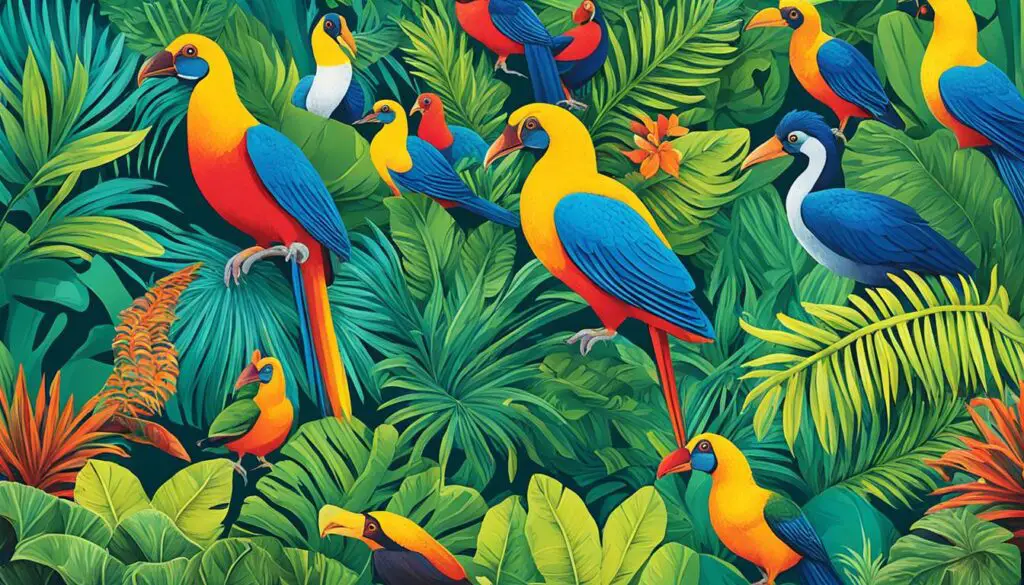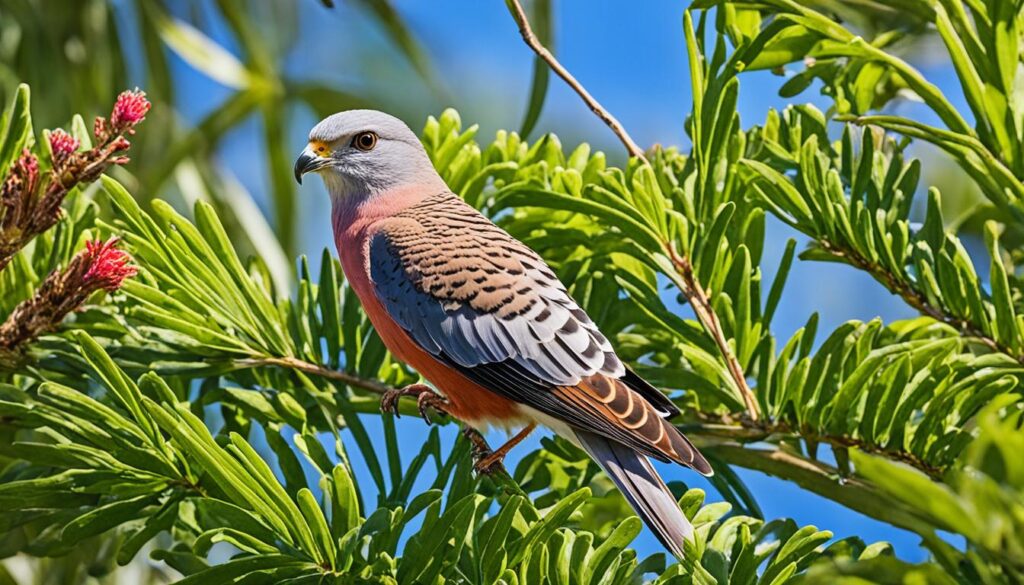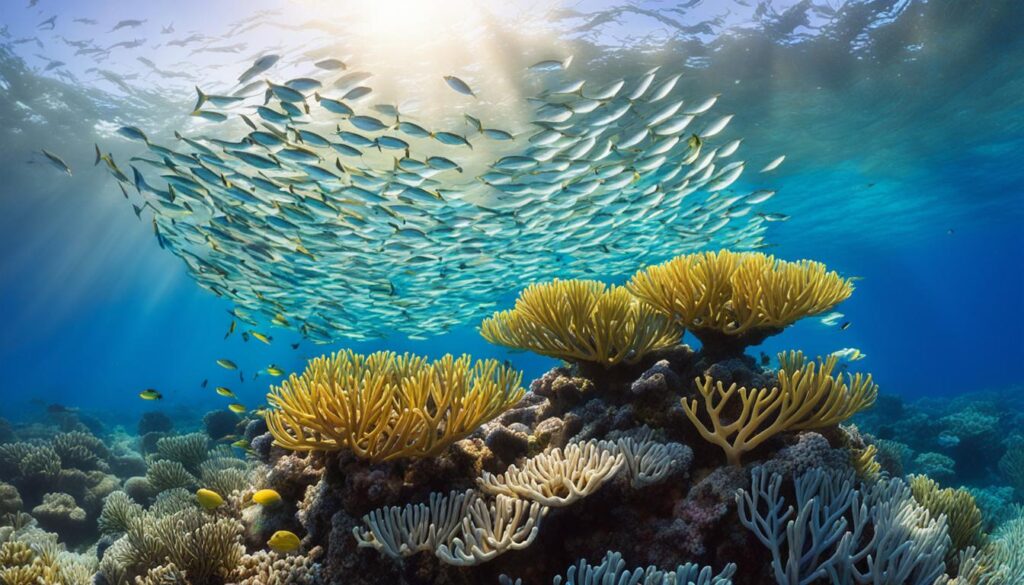Did you know that Mauritius, a small island in the Indian Ocean, is home to a remarkable collection of rare and unique species?

The isolation of Mauritius has led to the evolution of an extraordinary array of flora and fauna, with a significant number of species found nowhere else in the world. Despite its relatively small size, this tropical paradise boasts an incredible biodiversity that captures the imagination of wildlife enthusiasts and conservationists alike.
Key Takeaways:
- Mauritius is known for its diverse and endemic wildlife, making it a haven for rare and unique species.
- The isolation of the island has contributed to the evolution of species found nowhere else in the world.
- Habitat destruction and the introduction of non-native species pose significant threats to the survival of these animals.
- Conservation efforts, including the establishment of national parks and wildlife sanctuaries, play a vital role in protecting Mauritius’ unique fauna.
- Preserving the rich biodiversity of Mauritius is crucial for sustainable tourism and the overall ecological balance.
Endemic Mammals of Mauritius
Mauritius, being an isolated island, does not have any endemic terrestrial mammals. However, several mammalian species have been introduced to the island either intentionally or inadvertently. Unfortunately, these introduced mammals, such as the crab-eating macaque and rats, have had a significant impact on the local fauna. They prey on and compete with native species, posing a threat to the delicate balance of the ecosystem.
Conservation efforts in Mauritius are focused on protecting and preserving the remaining endemic mammal species. By implementing measures to control the population of introduced mammals and restore native habitats, conservationists aim to mitigate the negative effects on the endemic wildlife. These efforts are crucial for ensuring the survival of threatened species and preserving the unique biodiversity of Mauritius.
Threatened Endemic Mammals
| Species | Status |
|---|---|
| Mauritius fruit bat | Endangered |
| Mauritius flying fox | Endangered |
| Mauritius shrew | Critically endangered |
The above table showcases some of the threatened endemic mammal species in Mauritius. These animals play a crucial role in the island’s ecosystem, and their conservation is essential for maintaining a healthy and balanced environment. Conservation efforts include habitat restoration, captive breeding programs, and public awareness campaigns to reduce human impact on their habitats and ensure their long-term survival.
Birdlife in Mauritius
Over 100 bird species have been recorded in Mauritius, showcasing the island’s rich avian diversity. Among them, several species are endemic to Mauritius and can be found on both the main island and nearby Rodrigues Island. These endemic bird species are a testament to the unique biodiversity found in Mauritius.
Among the endemic bird species, two notable examples are the Mauritius kestrel and the pink pigeon. Both of these species have faced the threat of extinction but have shown encouraging signs of recovery thanks to dedicated conservation efforts.
The Mauritius kestrel, once on the brink of extinction with only four individuals remaining, has made a remarkable comeback. Through intensive conservation efforts, its population has rebounded to a stable level. The species can mainly be found in protected areas like the Black River Gorges National Park.
The pink pigeon, named for its distinctive pink and gray plumage, has also benefited from conservation efforts. This endemic bird species, once reduced to just a handful of individuals, has experienced a steady population increase. Now, with ongoing conservation measures in place, the pink pigeon has a more secure future.
However, despite the success stories, Mauritius’ birdlife still faces challenges. Invasive bird species, habitat destruction, and competition from introduced species continue to pose a threat to the endemic birds of Mauritius. Efforts are being made to address these issues and protect the diverse bird species found on the island.

Conservation Efforts for Birdlife in Mauritius
Conservation organizations and government agencies in Mauritius are actively working to protect the bird species of the island. Key initiatives include:
- Creating protected areas, such as national parks and nature reserves, to preserve the habitats of endemic birds.
- Implementing invasive species control programs to mitigate the impact of non-native bird species on native bird populations.
- Restoring degraded habitats and reforesting areas to provide suitable environments for bird species.
- Engaging in captive breeding and reintroduction programs for endangered bird species.
- Carrying out research and monitoring to better understand the needs and behaviors of bird species in Mauritius.
These conservation efforts are crucial for safeguarding the unique bird species of Mauritius and ensuring their long-term survival.
Reptiles and Amphibians of Mauritius
Mauritius is known for its rich biodiversity, and this extends to its reptile and amphibian populations. The island is home to several endemic reptiles, with Round Island being a particularly important habitat for these unique species. Some notable reptiles found in Mauritius include the Mauritius ornate day gecko, Bojer’s skink, and the keel-scaled boa.
Endemic Reptiles of Mauritius
Endemic reptiles are species that are found exclusively in a specific geographic area, such as Mauritius. These reptiles have adapted to their environment over time and have become an integral part of the island’s ecosystem.
One of the endemic reptiles found in Mauritius is the keel-scaled boa. This snake is known for its distinctive appearance, with a patterned body and prominent keeled scales. The keel-scaled boa plays a crucial role in controlling rodent populations on the island, making it a valuable species for ecological balance.
Here is a table showcasing some of the endemic reptiles found in Mauritius:
| Reptile Species | Scientific Name |
|---|---|
| Mauritius ornate day gecko | Phelsuma ornata |
| Bojer’s skink | Leiolopisma bojerii |
| Keel-scaled boa | Casarea dussumieri |
It is important to note that despite the conservation efforts, some reptile species, like the giant tortoises, have become extinct on the island. However, initiatives have been undertaken to introduce tortoises from other regions to restore the ecological balance.
Conservation efforts in Mauritius aim to protect and preserve the remaining reptile species. The establishment of protected areas and ongoing monitoring plays a crucial role in ensuring the survival of these endemic reptiles.
Marine Life in Mauritius
Mauritius, surrounded by vibrant coral reefs, is a haven for marine biodiversity. These reefs support a diverse array of marine life, making them a vital ecological resource. However, the fragile balance of this underwater ecosystem is under threat due to various factors.
Habitat Degradation
Human activities such as unsustainable fishing practices and coastal development have resulted in habitat degradation. Reckless fishing techniques, such as dynamite fishing and cyanide poisoning, not only destroy coral reefs but also disrupt the delicate marine food chain.
Climate Change
Mauritius, like many other coastal regions, is not immune to the effects of climate change. Rising sea temperatures, ocean acidification, and coral bleaching have had a detrimental impact on the health of the coral reefs and the marine life that depends on them.
To address these challenges and protect the marine biodiversity of Mauritius, conservation efforts are being undertaken.
Conservation Initiatives
Efforts are being made to conserve and restore coral reefs through initiatives such as artificial reef structures, coral gardening, and the establishment of marine protected areas. These measures help to preserve the biodiversity and integrity of the reefs, providing a safe haven for marine species to thrive.
One iconic marine species that is the focus of conservation efforts in Mauritius is the dolphin. Dolphins are highly intelligent and charismatic creatures that play a crucial role in maintaining the balance of the marine ecosystem. Conservation programs aim to protect their habitats, minimize disturbance from human activities, and raise awareness about responsible dolphin-watching practices.
The conservation of marine life in Mauritius is not only essential for the ecological health of the region but also for the tourism industry. Coral reefs and marine biodiversity attract visitors from around the world, contributing to the economy and providing opportunities for sustainable tourism.

By prioritizing the conservation of coral reefs, implementing sustainable fishing practices, and raising awareness about the importance of marine biodiversity, Mauritius is taking significant steps towards protecting its precious marine life for future generations to enjoy.
Conservation Efforts in Mauritius
Mauritius has been at the forefront of wildlife conservation and environmental preservation, recognizing the importance of protecting its unique biodiversity. Various initiatives have been implemented to safeguard the natural habitats and endangered species found on the island.
The establishment of national parks, wildlife sanctuaries, and protected areas has played a crucial role in wildlife conservation in Mauritius. These areas provide a safe haven for endemic species, allowing them to thrive and reproduce in their natural habitats. These protected areas not only focus on preserving the fauna but also promote the sustainable use of resources.
Mauritius has made significant efforts to protect endangered species, such as the Mauritius kestrel, pink pigeon, and echo parakeet. These species were once on the brink of extinction but have experienced an increase in population thanks to intensive conservation efforts. Through measures like habitat restoration, captive breeding programs, and the implementation of strict hunting regulations, these endangered species are gradually recovering.
Collaboration between government agencies, non-governmental organizations (NGOs), and local communities is vital for the success of conservation initiatives in Mauritius. Together, they work towards preserving the natural heritage and engaging in sustainable practices to protect the delicate ecosystems. Wildlife conservation education programs are also organized to raise awareness among the local population.
The conservation efforts in Mauritius are not limited to land. The protection of the marine environment and its biodiversity is also a priority. Measures are being taken to conserve coral reefs, combat overfishing, and promote sustainable marine tourism. The preservation of marine life, including iconic species like dolphins, is crucial for a healthy ecosystem and the sustainability of the tourism industry.
In conclusion, Mauritius is committed to wildlife conservation, protected areas, and environmental preservation. Through the establishment of national parks, sanctuaries, and collaborative efforts, the island is striving to safeguard its unique flora and fauna. The conservation initiatives implemented not only protect endangered species but also contribute to the overall sustainability and ecological balance of Mauritius. By preserving its natural treasures, Mauritius ensures that future generations can continue to experience the beauty and diversity of its wildlife.
Conclusion
Mauritius boasts a remarkable array of animals, showcasing a unique and diverse biodiversity that is found nowhere else in the world. However, the ongoing existence of these extraordinary species remains threatened by multiple factors, including habitat destruction and the introduction of non-native species. Conservation efforts play a pivotal role in safeguarding the rich natural heritage of Mauritius and ensuring the protection of its precious wildlife.
Through the establishment of national parks, wildlife sanctuaries, and comprehensive conservation programs, Mauritius actively strives to preserve and sustain its remarkable fauna for future generations. By implementing stringent measures, the country aims to maintain the delicate balance of its ecosystems, while also promoting sustainable tourism that fosters respect for nature and the environment.
It is essential that the conservation endeavors in Mauritius continue unabated. The tireless commitment to protecting these rare and endangered species not only secures their survival but also contributes to the preservation of the unique biodiversity that defines Mauritius. By appreciating and valuing the exceptional wildlife of the island, we can work towards a sustainable future in harmony with nature.
